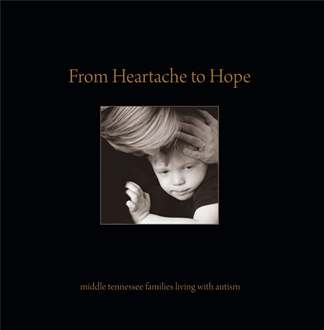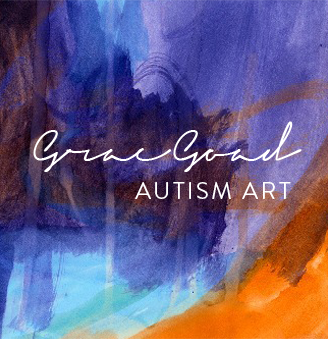Grasping a few stolen moments, I busily typed away, entering into the computer the volunteer protocol for setting up communion in our small Lutheran church (ECLA). C. was new there and already active. She stopped and chatted and then, cocking her head to the side, she wrinkled her brow and peered down at me with a look of intense concern:
"Is there something wrong with little Grace?"
Like so many other special needs mothers in my familial predicament, it was in retrospect that I formed my best choice response. Instead, stunned, I looked up at her–my eyes filled with disbelief–and replied weakly:
"She has autism."
To the question of if something was wrong, ideally I would have replied simply:
"No. She has autism."
In my quicker moments that's just what I've said.
In the informal mothers poll that I took, a friend who is earnest, sincere and devout in her Christian faith relayed the time that a faith healer was going door-to-door in her rural neighborhood. When my friend came to the door, the man could see that her son was rather affected by his disAbility of autism. The traveling healer then proceeded to inform my friend that her faith must thus be weak….
A friend of a friend, whom I once met, attended a Pentacostal church where she was a devout member and where her family of five sat on the back row given the behaviors of her child with autism. Eventually the family was told by church members that their daughter was demon possessed….
Sadly, that pronoucement is not isolated. Several years ago, a Milwaukee boy was inadvertently smothered in a pillow case during an attempted exorcism in a church.…The earliest record of autism dates to the Middle Ages. The symptoms described are clearly autism. The label given, however: demon possession.
Many deem a sense of spirituality–humankind's desire to connect with the Divine–a fundamental part of our make up. Likewise, in times of struggle, we often reach for a sense of something greater than our mortal selves. As I've written here on The Journey with Grace, our religious institutions have historically failed us. When special needs families most need words of kindness from fellow parishioners, they have too often, instead, received words of judgment, misunderstanding or silence. Statistics also reveal, historically, that 75 percent of families that would attend a faith community do not because they are misunderstood, asked to leave, and/or cannot literally get into the building due to accessibility issues.
I do believe this is changing, but it has been a long road my peer families have traveled the last 15 years since "we were diagnosed," and long before that for others….
My point with this post, the third and concluding "Things People Say" (*I think*) (maybe) is not to condemn religious organizations. Despite my jaded view of organized religion, I have traveled a continuum from fundamentally Christian conservative to moderate Christian to universalist–recognizing and honoring all paths–and liberal Christian to simply spiritual and universalist. Regardless of where we special needs parents are on our personal spiritual paths, we all need words of kindness within our faith communities. We want courtesies extended. And, for some, questions not asked–as some parents are too embedded in their unhealed pain, or sadly, embarrassed or not at peace and not ready for a stranger to broach the subject of their child's disAbility.
And folks: Don't. Ever. Tell a special needs parent that God chose them because "He" knew they can handle it. I know plenty who are not equipped to handle it for emotional, socio-economic reasons, etc. Please. I repeat: some parents are in intense pain. Some of that pain can even stem from religious beliefs that if they'd prayed more, were better Christians, if they'd lived more right, that they wouldn't have been…punished this way. Yeah. Some people believe that. And one doesn't know that when they decide to pop out with what pseudo warm and fuzzy proclamation that they think might be a nice thing to say. And really such statements may often really be more about what makes the person saying them feel better themselves in the face of their own discomfort over what is perceived as a deficit and less than perfect.
One friend became incensed when their church asked if his wife would become a Stephen's minister….
"Are you kidding me? WE need a Stephen's minister!"
(Good for him.) The family had been through multiple, intense surgeries and numerous physical complications…the list of the emotional and physical impact of their child's disAbility was seemingly endless at the time.
Though I truly agreed with him, I did not take too kindly to the anthroposophist who volunteered at my daughter's Waldorf preschool school–back when my daughter's diagnosis was very fresh–saying to me:
"You know your daughter has come to you to teach you lessons."
Ugh. I knew he meant well. I know others mean well. I get that.
There are ways to engage a special needs parent: With respect. Kindness. And, engagement when reciprocation is readily given. And advice? Suggestions? If ya just gotta, first inquire. See if they are open to talking about their child. Or, just hold off. You never know where that parent is on the spectrum of their grief….But holding off does not equate with silence. Silence hurts, too. How about: How are you doing? How are you feeling? How is your child doing? Is there something you need help with?
As a wise mother once said to me:
"We have to practice a lot of forgiveness on this journey don't we?"
Yes. We do. Which, if you are religious or spiritual (or both), brings us back home and to what it's all about. Both in the message of most religions and in a sense of spirituality, but also in how we deal with life: It starts within….By taking responsibility. Knowing that sticks and stones–though they seem to be all too plenty–well, it's a choice in how we deal.
So, to the cute dude with the rad boots and the Ron Paul stickers: You inspired this blog post series here. And, I'm glad you came along now at this juncture in my journey. At some point earlier, I might not have been this cool about your suggestion of giving my daughter a toke. But now you've given me a chance to reflect on choice, assessing where I've come from and where I am now. You gave me the opportunity to assume the best of another and also to practice forgiveness and compassion–which, again, starts at home. Thank you.





“And folks: Don’t. Ever. Tell a special needs parent that God chose them because “He” knew they can handle it.”
Or they twist a Bible verse and tell me that the Bible verse about temptation to say that God doesn’t give you more than you can handle. Most of all, I hate all versions of that one. I think people say that because they don’t know what else to say.
Yep. Thanks for pointing out the subtle difference of what people also say. It’s worse with the “more than.” Oh, yeah? How about the mother who’s kid played with matches and set her bed on fire. While she was sleeping in it in the middle of the night. The mom who works the night shift of 7/11. The mom who lives in a trailor park. What we all need is compassion. And these statements are not compassionate. Now…to be compassionate with them in saying it. Oy.
Wow. Today I found a kindred spirit.my special boy is 12.
Thank you, Lisa. 🙂
Hi .. well where do i start ..I’ve always been a quiet prosen and to myself all my life. Never been one to talk to anyone about anything not even when something was bothering me. I’ve been told that I am cold in some ways. Laughing is something that I don’t do a lot of. Even when a joke is told or a comedy is on tv which everyone else laughs at. Trying to keep my mind on one thing for a certain period is very difficult for me. I’m always changing the subject then I go back to it. For 5 yrs from the age of 20 to the age 25 .. I use to drink all the time from the time I woke up til I passed out , then I would start again. Plus, I use to take street drugs .. cocaine, uppers, downers and other drugs. I was trying to hide as some people would describe it. It was to deal with being depressed wanting to be happy and content.Then I was diagnosed with bi polar back in 2005 which is a disorder that is past down from generations. My mom fully understands now why I was/am the type of prosen that she had seen growing up and to this day. I also have fibromylgia which i was diagnosed with back in 2002 but the government didn’t recognize as a disorder unless you have a severe prolonged illness. One of your other readers had the same problem with CPP .. Once I got diagnosed with bi polar was when the government realized that I had another illness. So they accepted my application at that time which I did get a check from 2002 up to 2005 .. now I am on both disabilities .. ODSP and CPP . They aren’t the only illnesses I was diagnosed with. I also have Hep. C which also was diagnosed back in 2002. Even the medication that they have me on helps a bit but there is no miracle ones out there. I’ve tried natural herbs, nutritional drinks and other things to try to work for me with the bi polar and the fibromylgia including exercising. I do deal with life and I’m not on street drugs or alcohol even though it would be so easy for me to go back to that way of life. My son is the one major reason that I’m not on them. I am one to clutch onto a prosen if you would like to describe it that way to be able to get through life and stay away from the way I use to be. I hope your readers can relate to part of my life. Pauline